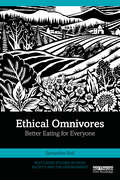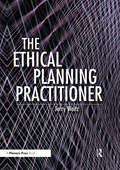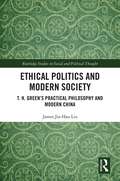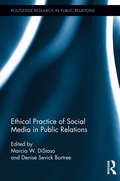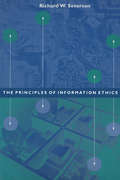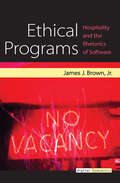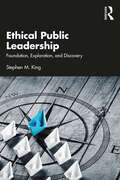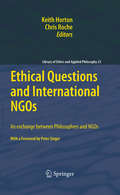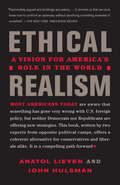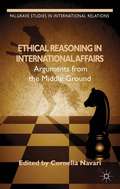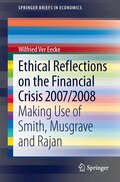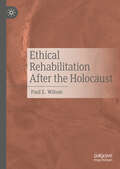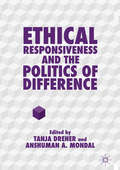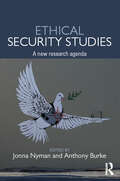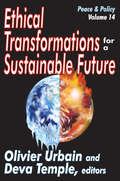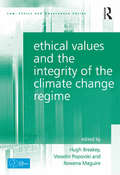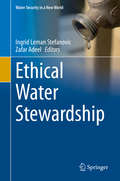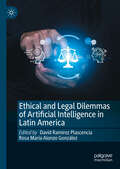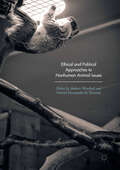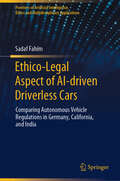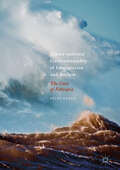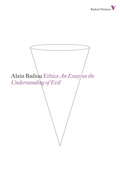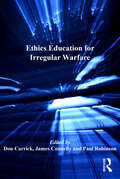- Table View
- List View
Ethical Omnivores: Better Eating for Everyone (Routledge Studies in Food, Society and the Environment)
by Samantha NollThis book provides a detailed overview of ethical omnivorism, as well as the philosophical foundations of this movement and diet.Many eaters are concerned about the impact that their food choices have on the environment, animals, and human health. Ethical omnivorism is at once a new food ethic, diet, and global movement aimed at providing a flexible path for eaters committed to bringing about lasting change one meal at a time. While publications in food ethics are largely dominated by vegetarian titles, this book explores the viability of omnivorism, a dietary choice which is not devoid of animal products, but one which embraces eating local, eating organic, and eating humanely raised food products. In doing so, this diet builds on the local food movement’s desire to know where food comes from and stresses the importance of maintaining high animal welfare and environmental standards. Overall, this book provides a foundational overview of ethical omnivorism as a food movement and guidance for those interested in eating ethically, while recognizing that many factors influence dietary choices.This book will be of great interest to students and scholars of food studies, food, agriculture and animal ethics, environmental philosophy, and those more widely interested in making ethical food choices.
Ethical Planning Practitioner
by Jerry WeitzIf a local college gives a city planner tickets to a sold-out football game, is it wrong to take them – even if the planner pays? Should a planning consultant bid on a project that has a clearly unrealistic timeframe? Can a planning director moonlight for another agency? For practicing planners, potential ethics violations abound, and the eye of public scrutiny never blinks. Planners need a guide, and now they have it: the first guidebook based on the current revision of the AICP (American Institute of Certified Planners) Code of Ethics and Professional Conduct. The Ethical Planning Practitioner presents 76 scenarios, all real-life dilemmas based on the code's rules of conduct. Each scenario comes with tools to help planners explore the answers on their own, in a training session, or in a classroom. This vital handbook looks at everyday ethics the way planners need to see them, in black, white, and shades of gray – but most of all, clearly. It will not only instruct but inspire planners to strengthen the public's trust.
Ethical Politics and Modern Society: T. H. Green’s Practical Philosophy and Modern China (Routledge Studies in Social and Political Thought)
by James Jia-Hau LiuEthical Politics and Modern Society introduces and critically examines British idealist philosopher, Thomas Hill Green, his practical philosophy, and its reception in China between the late nineteenth century and the early twentieth century. As a response to the modernity issue in Great Britain, Green's philosophy, in particular his ethical politics, anticipated a practical solution to the individual alienation issue in modern society. Witnessing the resemblance between Green’s ethical politics and classical Chinese ethical and political thought, some Chinese scholars became inclined to take Green’s thought as an intellectual approach to assimilate Western modernity. While Green and the Chinese scholars both intended to articulate an ethical conception of modern politics in response to the issue of modernity, their results were very different. In this book, James Jia-Hau Liu analyses why modern Chinese scholars introduced Green’s philosophy to China and why the studies of Green’s philosophy in China have since faded away. Modern Chinese scholars, such as Gao Yi-Han, Chin Yueh-Lin, Tang Jun-Yi, Chang Fo-Chuan, and Yin Hai-Guang, are explored in greater detail. The contradictory standings towards modernity between Green and Chinese scholars illustrate how to understand the difference forms of modernity that can be embodied therein. Ethical Politics and Modern Society is a valuable resource to scholars of political philosophy, political theory, history of social and political thought, British idealism, and the work of Thomas Hill Green.
Ethical Practice of Social Media in Public Relations (Routledge Research in Public Relations)
by Marcia W. DiStaso Denise Sevick BortreeGiven the high rate of social media use by the public, organizations are compelled to engage with key audiences through these outlets. Social media engagement requires organizations to actively participate with public groups, and this highly-interactive exchange raises a new set of ethical concerns for communicators. In this rapidly changing communications environment, the long-term implications of social media are uncertain, and this book provides the much needed research to understand its impact on audiences and organizations. Through an examination of a broad range of ethics concepts including transparency and online identities, policies, corporate responsibility, and measurement, this book explores a variety of topics important to public relations such as diversity, non-profit communication, health communication, financial communication, public affairs, entertainment communication, environmental communication, crisis communication, and non-profit communication. The chapter authors, expert scholars within their fields of public relations, offer insights drawn from original research and case study examples of ethical dilemmas raised by social media communication.
Ethical Principles for the Information Age
by Richard SeversonThis text presents the author's model of following principled ethics together with by chapters on each of the guiding principles: respect for intellectual property, principle of fair representation, privacy, and the principle of nonmalfeasance. It avoids the use of technical jargon.
Ethical Programs: Hospitality And The Rhetorics Of Software
by James J. BrownLiving in a networked world means never really getting to decide in any thoroughgoing way who or what enters your "space" (your laptop, your iPhone, your thermostat . . . your home). With this as a basic frame-of-reference, James J. Brown's Ethical Programs examines and explores the rhetorical potential and problems of a hospitality ethos suited to a new era of hosts and guests. Brown reads a range of computational strategies and actors, from the general principles underwriting the Transmission Control Protocol (TCP), which determines how packets of information can travel through the internet, to the Obama election campaign's use of the power of protocols to reach voters, harvest their data, incentivize and, ultimately, shape their participation in the campaign. In demonstrating the kind of rhetorical spaces networked software establishes and the access it permits, prevents, and molds, Brown makes a significant contribution to the emergent discourse of software studies as a major component of efforts in broad fields including media studies, rhetorical studies, and cultural studies.
Ethical Public Leadership: Foundation, Exploration, and Discovery
by Stephen M. KingDozens of books are published each year on leadership, but as pundits, scholars, philosophers, and public intellectuals note, what is written is too often shallow and facile, oriented toward quick fixes for performance enhancement or internal organizational and personnel development. Drawing from a diverse range of literature, including history, philosophy, public administration, leadership, religion, and spirituality, this book fills an important gap, exploring what it means to be an ethical and moral leader. It takes a deep dive into the many challenges of leadership, examining the continuing contrast between bureaucracy and democracy, the unique ethical and moral characteristics of nonprofit and faith-based organizations, and the globalization of organizations and institutions. Throughout the book, author Stephen M. King develops a more holistic and interdisciplinary understanding of ethical and moral leadership, required for more thoughtful theoretical and empirical research. He points students of leadership to the time-honored values of ethics and morality, reestablishes the ethical balance between bureaucracy and democracy, and helps reorient the values' purpose of public, nonprofit, and global institutions, providing hope of a better future for leadership. Ethical Public Leadership is required reading for students of public administration and nonprofit management, as well as for practicing public servants and nonprofit sector employees at all levels.
Ethical Questions and International NGOs
by Keith Horton Chris RocheIn recent decades there has been a great expansion in the number, size and influence of International Non-Governmental Organisations (INGOs) involved in international relief and development. These changes have led to increased scrutiny of such organisations, and this scrutiny, together with increasing reflection by INGOs themselves and their staff on their own practice, has helped to highlight a number of pressing ethical questions such organisations face, such as: should INGOs attempt to provide emergency assistance even when doing so risks helping to fuel further conflict? How should INGOs manage any differences between their values and those of the people they seek to benefit? How open and honest should INGOs be about their own uncertainties and failures? This book consists of sustained reflections on such questions. It derives from a workshop held at Melbourne University in July 2007 that brought together a group of people - for the most part, reflective practitioners and moral and political philosophers - to discuss such questions. It explores honestly some of the current challenges and dilemmas that INGOs face, and also suggests some new ideas for meeting these challenges. Our hope is that the kind of explicit reflection on the ethical issues INGOs face exemplified in this publication will help to promote a wider debate about these issues, a debate that in turn will help INGO managers and others to make better, wiser, more ethically informed decisions.
Ethical Realism: A Vision For America's Role In The World
by Anatol Lieven John HulsmanLieven (a senior research fellow at the New America Foundation) and Hulshman (a former senior research fellow at The Heritage Foundation and a member of the Council on Foreign Relations) propose to steer American foreign policy away from the contradictory directions of hard-line realism and utopian morality and towards an "ethical realism" that incorporates moral thinking into classical realist concerns of national interests. They link this concept, influenced by Reinhold Niebuhr, Hans Morgenthau, and George Kennan, with the concept of the "Great Capitalist Peace," which accommodates other great powers in an effort to make stakeholders of much of the world. After expanding upon their twin concepts they describe how they should be applied to the Iraq War (e. g. establish a US-sponsored regional concert to prevent civil war) and confrontations with Iran and Korea, among other foreign policy flashpoints. Annotation ©2007 Book News, Inc. , Portland, OR (booknews. com)
Ethical Reasoning in International Affairs
by Cornelia NavariArguing for a middle ground between idealism and realism, this book considers the most pressing ethical and moral issues in contemporary international politics, including intervention, human rights and aid, and sets about reasoning how to resolve them in politically realistic ways.
Ethical Reflections on the Financial Crisis 2007/2008
by Wilfried Ver EeckeIn this book the author reflects on the philosophical and ethical bases of the financial crisis 2007-08 and the subsequent recession. He finds in Adam Smith solid arguments for the new free market economy, capitalism, but also arguments for a role for the government in the case of public goods (roads) and of merit goods (education, control of banking). Where the provision of public goods requires that the government respect consumer sovereignty there the provision of merit goods legitimizes the violation of that principle. By making use of the history of economic thought (e.g., the neo-liberal tradition) the author demonstrates that Musgrave's idea of merit goods can be expanded to eleven domains in which the government has an important function. He legitimizes that move by using the Kantian argument that we must accept the possibility conditions for what we want. The author demonstrates that Rajan, Reich and Reinhart & Rogoff make use of seven of his eleven categories of merit goods in order to explain the financial crisis 2007-08 and the subsequent recession. The author thereby provides a philosophical and ethical analysis of the government's failures at the basis of the financial crisis.
Ethical Rehabilitation After the Holocaust
by Paul E. WilsonGenocide murders innocents in a society, and it leaves behind moral corruption and societal twistedness. A genocide like the Holocaust can happen only if the normative ethical commitments to honor the fundamental right to life are compromised or abandoned. When a society lives through a genocide, the moral imagination of peoples and collectives, their ethical behaviors, and even the underlying social contract become twisted and broken. Societies and individuals caught within a genocide need an ethical rehabilitation to move a post-genocidal society out of its ethical degradation. This book discusses the steps of transitional justice as ethical ways to move individuals and societies away from lingering injustices and toward an equilibrium of justice.
Ethical Responsiveness and the Politics of Difference
by Anshuman A. Mondal Tanja DreherThis edited collection focuses on the ethics, politics and practices of responsiveness in the context of racism, inequality, difference and controversy. The politics of difference has long been concerned with speech, voice and representation. By focusing on the practices and politics of responsiveness—listening, reading and witnessing—the volume identifies vital new possibilities for ethics and social justice. Chapters focus on the conditions of possibility, or listening as ethical praxis; unsettling or disrupting colonial relationships; and ways of listening that highlight non-Western traditions and move beyond the liberal frame. Ethical responsiveness shifts some of the responsibility for negotiating difference and more just futures from subordinated speakers, and on to the relatively more privileged and powerful.
Ethical Security Studies: A New Research Agenda (Routledge Critical Security Studies)
by Anthony Burke Jonna NymanAt a time of grave ethical failure in global security affairs, this is the first book to bring together emerging theoretical debates on ethics and ethical reasoning within security studies. In this volume, working from a diverse range of perspectives—poststructuralism, liberalism, feminism, just war, securitization, and critical theory—leading scholars in the field of security studies consider the potential for ethical visions of security, and lay the ground for a new field: "ethical security studies". These ethical ‘visions’ of security engage directly with the meaning and value of security and security practice, and consider four key questions: • Who, or what, should be secured? • What are the fundamental grounds and commitments of different security ethics? • Who or what are the most legitimate agents, providers or speakers of security? • What do ethical security practices look like? What ethical principles, arguments, or procedures, will generate and guide ethical security practices? Informed by a rich understanding of the intellectual and historical experience of security, the contributors advance innovative methodological, analytical, political and ethical arguments that represent the cutting edge of the field. This book opens a new phase of collaboration and growth that promises to have great benefits for the more humane, effective and ethical practice of security politics. This book will be of much interest to students of critical security studies, ethics, philosophy, and international relations.
Ethical Transformations for a Sustainable Future: Peace and Policy (Peace And Policy Ser.)
by Deva TempleIt has become increasingly apparent that humanity's complex social, political, and economic systems are incompatible with the finite capacity of the Earth to replenish resources and absorb wastes. If the planet is to continue to be habitable for the myriad web of other creatures that make life possible, humans must transform their systems so that they are aligned with natural systems. One thing is sure it will not be Nature's laws, the delicate interdependence that characterizes Earth's ecosystems, that change. The change must begin within each person, and from there permeate throughout our social, political, and economic structures.The contributors to this volume believe that such transformations are urgently needed and possible, and they offer specific examples. They suggest solutions that call for new perspectives in our ethics, beliefs, traditions, economy, business, gender relations, education, and technology. They show that human beings have the power to implement changes in all natural and social environments.The chapters in this book have been organized around three keywords: Reconnecting, Reframing, and Rethinking. The contributors argue that we need to reconnect with the Earth and nature, as well as with each other and parts of ourselves that we have ignored for too long. We need to reframe the way in which people prioritize choices in the economy, the way we do business and pursue development; and we need to rethink the mission of education and the roles of technology.
Ethical Values and the Integrity of the Climate Change Regime (Law, Ethics and Governance)
by Vesselin Popovski Hugh BreakeyThis book investigates the ethical values that inform the global carbon integrity system, and reflects on alternative norms that could or should do so. The global carbon integrity system comprises the emerging international architecture being built to respond to the climate change. This architecture can be understood as an 'integrity system'- an inter-related set of institutions, governance arrangements, regulations and practices that work to ensure the system performs its role faithfully and effectively. This volume investigates the ways ethical values impact on where and how the integrity system works, where it fails, and how it can be improved. With a wide array of perspectives across many disciplines, including ethicists, philosophers, lawyers, governance experts and political theorists, the chapters seek to explore the positive values driving the global climate change processes, to offer an understanding of the motivations justifying the creation of the regime and the way that social norms impact upon the operation of the integrity system. The collection focuses on the nexus between ideal ethics and real-world implementation through institutions and laws. The book will be of interest to policy makers, climate change experts, carbon taxation regulators, academics, legal practitioners and researchers.
Ethical Violence
by Carlo BordoniHuman civilization is founded on ethical principles, norms of behaviour that have accumulated over time. Perhaps the oldest of ethical principles is the rejection of violence, which includes the respect for life and for the physical and psychological integrity of others. But, in some circumstances, violence itself can be regarded as ethical – for example, when it is used by states claiming to act in self-defence. In these circumstances, the need to defend oneself against an enemy can transform war from an unacceptable act into a necessary, socially shared and morally sanctioned choice. And it is when violence becomes ethical that we must begin to fear for our future. In the wake of the pandemic, we are witnessing the growing prevalence of aggression and emotionality in social and political life. We find ourselves living in an increasingly impatient and insecure society, which is sceptical of scientific thought and which takes refuge in the irrational. The decline of rationality and the growing prevalence of violence are increasingly common features of a society that has lost touch with the great Enlightenment narrative. We need, argues Bordoni, to rediscover the rationality we have lost and recuperate the positive side of technology.
Ethical Water Stewardship (Water Security in a New World)
by Ingrid Leman Stefanovic Zafar AdeelThis interdisciplinary book brings philosophers and non-philosophers to the table to address questions of water ethics, specifically in terms of how moral questions inform decision making around water security at local, national, and international scales.Water security, which pertains to the experience of assured access to clean water, is a broad concept that intersects human rights, politics, economics, law, legislation, public health, trade, agriculture, and energy. Decisions made at each of these intersection points have ramifications for human well being, especially for the populations that are marginalized in a societal and political sense. In this book, the ethical dimensions of decision-making at those intersection points are explored, and real-world examples are used to tease out some key insights. It charts how ethical consideration can help shape a future in which everyone will be water secure.
Ethical and Legal Dilemmas of Artificial Intelligence in Latin America
by David Ramírez Plascencia Rosa María Alonzo GonzálezThis book analyzes the potential benefits of using artificial intelligence to surpass traditional social and economic problems in Latin America, but it also looks to understand the perils and barriers derived from the adoption of this technology. This volume is divided in Section 1. &“Considering AI in the private sphere&” that debates about the employment of artificial intelligence from the citizen&’s perspective. It embraces topics related with the introduction of AI in the media and the labor market, and how Latin Americans perceive, engage and mobilize before the rising presence of AI in their daily lives. Section 2. Challenges and promises of AI in the public sector centers on the ethical and legal controversies triggered by the incorporation of artificial intelligence in the public sphere. It focuses on the promising benefits of introducing AI in the public administration, education and public security, but also the latent impacts on human rights.
Ethical and Political Approaches to Nonhuman Animal Issues
by Andrew Woodhall Gabriel Garmendia da TrindadeThis book offers ethical and political approaches to issues that nonhuman animals face. The recent 'political turn' in interspecies ethics, from ethical to political approaches, has arisen due to the apparent lack of success of the nonhuman animal movement and dissatisfaction with traditional approaches. Current works largely present general positions rather than address specific issues and principally rely on mainstream approaches. This book offers alternative positions such as cosmopolitan, libertarian, and left humanist thought, as well as applying ethical and political thought to specific issues, such as experimentation, factory farming, nonhuman political agency, and intervention. Presenting work by theorists and activists, insights are offered from both ethics and politics that impact theory and practice and offer essential considerations for those engaging in interspecies ethics within the political turn era.
Ethico-Legal Aspect of AI-driven Driverless Cars: Comparing Autonomous Vehicle Regulations in Germany, California, and India (Frontiers of Artificial Intelligence, Ethics and Multidisciplinary Applications)
by Sadaf FahimThis book is a comparative study of the laws and regulations involving legal and ethical issues related to Artificial Intelligence (AI), in particular for self-driving cars or autonomous vehicles (AVs). It identifies, analyzes, and points out such issues via a study of laws and regulations in India, Germany, and California, determining the legal liabilities of designer, developer/programmer, manufacturer, producer, users, or AI in the case of AVs. AV technology is being touted as one that is poised to bring revolution in the mobility ecosystem by lessening the number of accidents and by providing other benefits, such as potential to reduce traffic, increase safety and mobility, lower energy usage and generate free time. Despite having such a potential to shape and transform the future, and involvement of tech-giants like Google, Amazon, Facebook, and Microsoft, regulations around AI and AVs are still on the drawing board stage in many countries, as they grapple on how to address this issue which has both local and global players involved and affects both local and global populace. The book studies and compares the existing and evolving regulations in three different regions to bring out the lacunae, loopholes and best practices. It highlights when AI deserves legal personhood, and when it requires to be granted legal standing. It also points out the civil and criminal legal liabilities arising when AV is involved in an accident, and the ethical issues involved in the deployment of AI. The book goes beyond new regulations to analyze whether challenges and problems arising from AI technology can be addressed within existing civil and criminal laws - procedural and substantive law – or whether a sui generis law on AI technology is required. The analysis and the results showcased here would be highly useful for multi-disciplinary research on the topic. Regulators of both industry and governance would find the contents invaluable in getting a broader picture of the issues and concerns around this topic, along with policy makers would be able to come up with more effective regulations on AI and AVs.
Ethico-political Governmentality of Immigration and Asylum: The Case of Ethiopia
by Dilek KaralBased on content analyses of three international organizations’ policy reports and interviews with Somali refugees and refugee organizations, Dilek Karal examines the construction of ethico-political paradigm for immigration and asylum policies in Ethiopia. Departing from an assertion that ethico-political power is an intrinsic part of neo-liberal governmentality (and thus immigration and asylum policy formation), this volume unearths its mechanisms in Ethiopia’s current immigration and refugee legislation and in global policy propositions moving forward. Ultimately, the exclusionary character of the propositions for Ethiopian states’ governance of migrants is revealed through close interviews, data analysis, and applied analytics of governmentality method.
Ethics
by Alain Badiou Peter HallwardAlain Badiou, one of the most powerful voices in contemporary French philosophy, shows how our prevailing ethical principles serve ultimately to reinforce an ideology of the status quo and fail to provide a framework for an effective understanding of the concept of evil.
Ethics As Foreign Policy: Britain, The EU and the Other (Interventions)
by Dan BulleyEthical foreign policy has often been considered utopian, unrealistic and potentially very dangerous. Dan Bulley argues for a reconceptualisation of ethics as foreign policy, as both look to how we can, and ought to, relate to others. Inspired by the deconstructive thought of Jacques Derrida, Bulley studies the ethical claims of British (1997-2007) and EU (1999-2004) foreign policy. These claims are read against themselves to illustrate their deep ambiguity. A textual analysis of speeches, statements and interviews given by foreign policy makers shows that a responsibility to save ‘Africa’, to protect Iraqis, and to hospitably welcome the Balkans into the EU are also irresponsible, inhospitable and unethical. The author contends that foreign policies making a claim to morality are ethical and unethical, in their own terms, suggesting that while a truly ethical foreign policy remains ultimately unachievable, it does not justify abandoning a responsible relation to others. Rather, a negotiation of ethics as foreign policy suggests potential individual, context-bound decisions which remain open to contestation and permanent critique. Bulley argues that the goal of ethical foreign policy must be maintained as a productive hope of what is neither completely impossible, nor entirely possible.
Ethics Education for Irregular Warfare (Military and Defence Ethics)
by Paul Robinson James Connelly Don CarrickFollowing on from Ethics Education in the Military (eds. Paul Robinson, Nigel de Lee and Don Carrick: Ashgate 2008) which surveyed and critically analyzed the existing theory and practice of educating soldiers, sailors and airmen in the ethics of 'old fashioned' warfaring, this volume considers the extent to which such theory and practice is adequate to prepare members of the military to meet the more complex ethical challenges faced when engaging in irregular warfare in the 21st century. In recent years, events in Iraq and Afghanistan have highlighted the requirement that Western military personnel, drawn from the armed forces of many different countries, should behave in an ethical manner at all times. The contributors to this volume come from various disciplinary backgrounds, several are serving or former military officers and most are actively engaged in ethics education. The volume advances theoretical understanding of different approaches to ethics education and provides practical conclusions.
